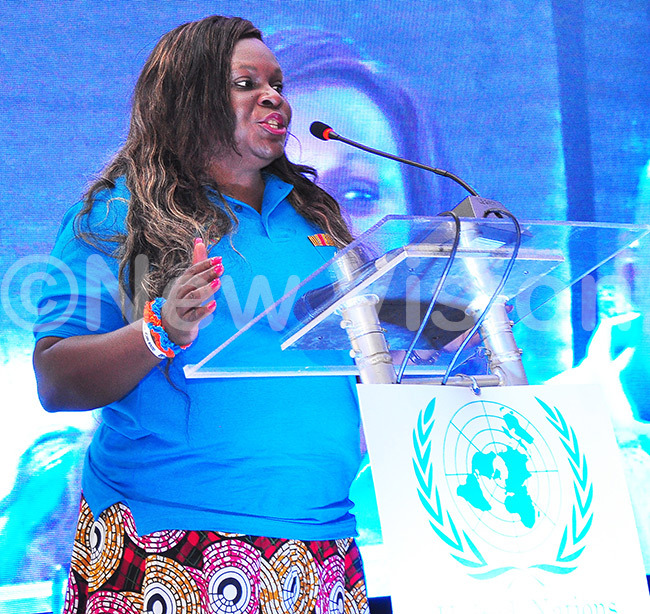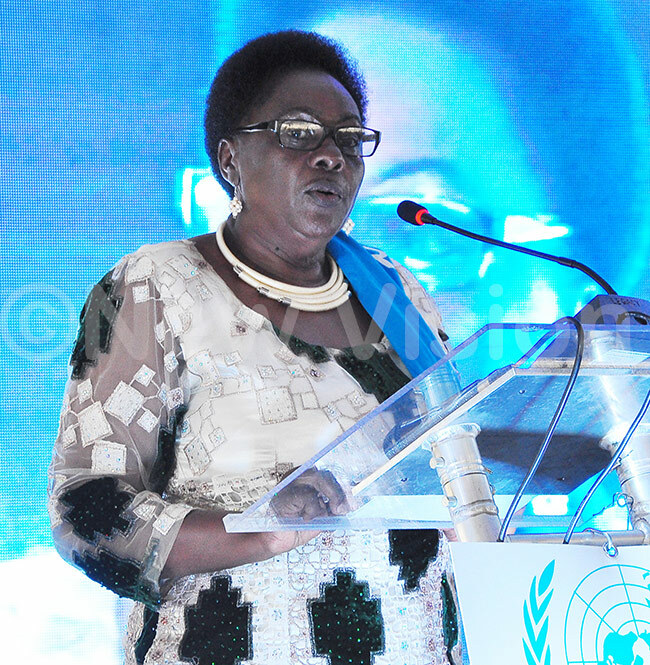UN to support Uganda's transformation journey
UN agencies in Uganda pledge to never give up working with Ugandans to achieve inclusive development, protect the environment, sustain peace and remain a beacon of hope and dignity for refugees,” Rosa Malango, the UNDP and UN Resident Coordinator, said.
(L-R) UN Resident Coordinator, Rosa Malango interacts with Minister of General Duties in the Office of the Prime Minister, Mary Karoro Okurut (C) as UNICEF Country Representative Dr Doreen Mulenga looks on during the United Nations day celebrations at Kololo Independence Grounds in Kampala onOctober 24, 2018. Photos by Juliet Kasirye
The United Nations (UN) has pledged support and commitment towards the country's desired middle income status.
Uganda Vision 2040 provides development paths and strategies to operationalize a transformed Ugandan society from a peasant to a modern and prosperous country within 30 years.
"I would like to thank the people of Uganda for letting us be part of their transformation journey. On this day, UN agencies in Uganda pledge to never give up working with Ugandans to achieve inclusive development, protect the environment, sustain peace and remain a beacon of hope and dignity for refugees," Rosa Malango, the UNDP and UN Resident Coordinator, said.
Malango made the remarks at the UN day celebrations held at Kololo Independence grounds on Wednesday.
 UN Resident Coordinator, Rosa Malango speaking
UN Resident Coordinator, Rosa Malango speaking
UN agencies in Uganda joined the rest of world to commemorate UN day under the theme: UN is us with a call to members of the public to recognise that they too are the UN and have a role to play in contributing to the attainment of the Sustainable Development Goals (SDGs).
October 24 is celebrated as United Nations Day since 1948. The day is devoted to making known to people of the world the aims and achievements of the United Nations Organisation. It is part of United Nations Week, which runs from 20 to 26 October.
Prime Minister Dr Ruhakana Rugunda, in a speech read for him by the general duties minister, Mary Karooro Okurut, appreciated UN for being a reliable partner to the Government of Uganda.
Uganda became a member of UN after her independence in 1962. Uganda was privileged to produce a former UN president Sam Kutesa who doubles as the minister of foreign affairs.
"Everyone has a role to play in achieving SDGs and new innovations will be required in responding to national development goals and attainment of a middle income status," Rugunda said in a statement.
The Premier commended UN agencies for responding to the Government efforts in health, agriculture, education and disaster response among others areas. He specifically hailed the UN for humanitarian aid towards the swelling number of refugees in Uganda.
Sustainable Development Goals are a collection of 17 global goals set by the United Nations General Assembly in 2015.
These 17 Goals build on the successes of the Millennium Development Goals, a universal call to action to end hunger, poverty, achieve good health, quality education, gender equality, clean water and sanitation, clean energy, good jobs and economic growth, reduced inequalities, sustainable cities and communities, responsible consumption, climate change, innovation, peace and justice, among other priorities.
UN Secretary General António Guterres in his statement to mark the day said: "On this day, we reaffirm our commitment: To repair broken trust; to heal our planet; to leave no one behind. We will never give up."
He noted that many women do not control their own finances. Only 58% of women in developing economies have bank accounts. "Women's financial inclusion and equality are essential to end poverty and achieve the Global Goals," Guterres added.
 Minister of General duties in the Office of the Prime Minister, Mary Karoro Okurut addresses delegates
Minister of General duties in the Office of the Prime Minister, Mary Karoro Okurut addresses delegates
Conflicts leading to reversals in SDG progress
The 2018 SDG Index indicates that most developing countries have experienced significant progress towards ending extreme poverty in all its forms, including income poverty, undernourishment, access to health and education services, and access to basic infrastructure.
Achievement gaps are greatest towards universal completion of secondary education. Countries experiencing conflict have experienced some of the sharpest reversals, particularly towards achieving Goal 1 (no poverty) and Goal 2 (no hunger).